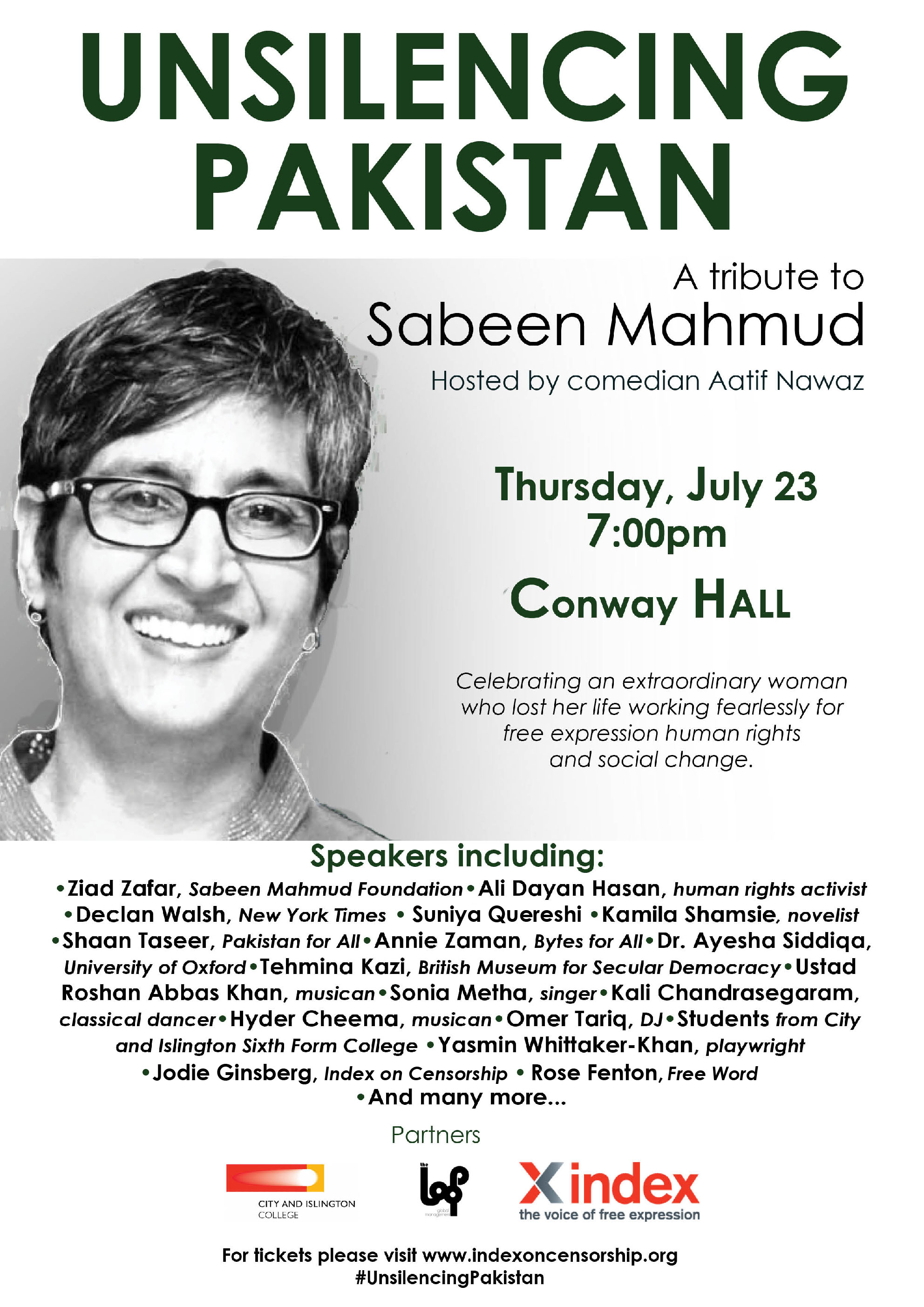22 Jun 2015 | Events

In May 2007 Sabeen Mahmud founded The Second Floor (now known as T2F), a coffee house and “community space for open dialogue” in Karachi, Pakistan.
In April 2015, Mahmud was shot dead by unidentified gunmen. Travelling home after hosting a panel discussion on the missing people of Balochistan, a poor but resource rich province of Pakistan, armed motorcyclists surrounded her car and opened fire.
Three months after this brutal act, Index on Censorship are working together with Yasmin Whittaker-Khan, Anneqa Malik and the Sabeen Mahmud Foundation to commemorate and celebrate an extraordinary woman.
Featuring prominent speakers alongside live art, music, poetry and Pakistani food.
Hosted by British-Pakistani stand-up comedian and TV presenter Aatif Nawaz. With:
- Ali Dayan Hasan, Pakistani human rights activist
- Annie Zaman, Bytes for All
- Declan Walsh, New York Times
- Dr Ayesha Siddiqa, University of Oxford
- Jodie Ginsberg, Index on Censorship
- Kali Chandrasegaram, classical dancer
- Hyder Cheema, musician
- Kamila Shamsie, novelist
- Omer Tariq, DJ
- Shaan Taseer, Pakistan for All (and son of late Salman Taseer)
- Sonia Metha, singer
- Students from City And Islington Sixth Form College
- Suniya Qureshi, Qismat Foundation
- Tehmina Kazi, British Muslims for Secular Democracy
- Ustad Roshan Abbas Khan, musician
- Yasmin Whittaker-Khan, playwright
- Ziad Zafar, Sabeen Mahmud Foundation
When: Thursday 23 July, 7:00pm
Where: Conway Hall, 25 Red Lion Square, London WC1R 4RL (Map/directions)
Tickets: Free, book here
Presented in partnership with Conway Hall Ethical Society and the Sabeen Mahmud Foundation

30 Jan 2012 | Russia
The Russian Central Election Committee has refused to register Grigory Yavlinsky — founder of the Yabloko opposition party — as a presidential candidate. Yabloko did not reach the seven per cent minimum in the State Duma elections, but according to electoral law, the party should still have been able to register Yavlinksy as a presidential candidate with two million signatures in support. The committee rejected 25 per cent of the signatures he collected, deeming them to be defective.
Yavlinsky said that according to the committee’s documentation, less than three per cent of signatures were fraudulent, while the other 23 per cent contained “other infringements of paper execution.” The law says the number of defective signatures must not exceed five per cent.
The party denies the allegations, and continue to insist that the majority of signatures were authentic. Many well-respected artists and public figures signed in support of Yavlinsky, including former Soviet Union president Mikhail Gorbachev.
“The committee’s decision is politically motivated,” Yavlinsky told journalists, expressing concern that authorities are compromising voters’ right to choose a candidate. “Clearly this is not a decision celebrating the rule of law and allowing citizens to influence the election process,” he concluded.
A number of Russian opposition politicians said that refusal to register Yavlinsky could delegitimise the upcoming elections. The organisers of the 4 February “rally for fair elections” condemned the Committee’s decision.
Russian Prime Minister and presidential candidate Vladimir Putin’s spokesperson Dmitry Peskov told Interfax news agency it is “absurd to protest against the Central Election Committee’s decision.”
Yabloko’s watchdogs are preparing to monitor the presidential elections on 4 March. In December’s Duma elections they reported mass fraud and election law violations, but only a few succeeded in fighting those violations in court. Most judges simply denied allegations and refused to bring law violators to justice. Yabloko activists claim that Russian courts are not independent, leaving the violations unprosecuted.
Russia’s leading independent election monitors’ association, GOLOS, also questions the independence of Russian courts. Deputy director Grigory Melkonyants told Index that election results cannot be disputed in court, as judges refuse to take evidence of violations into consideration.
In the run up to the parliamentary elections, GOLOS was targeted by pro-government media for launching an interactive online map of election violations. The propaganda war against GOLOS is now restarting as they gear up for the presidential elections. After launching a new map of violations, the organisation received a document demanding that they vacate their Moscow offices on 16 January. Police visited a joint event held by GOLOS and Memorial for the first time, and activists from both organisations viewed their presence as an act of “psychological pressure.” A few days before the incident, the head of the Federal Security Service department, in the Komi republic of Russia labeled the organisations as “extremists” aiming to “wreck the upcoming elections.”
With millions angered by Yavlinsky’s removal from the race, and the inability of activists to bring election law violators to justice through biased courts, many believe that the mass protests on 4 February will garner more participants than the last two demonstrations against fraudulent parliamentary elections.
7 Dec 2011 | Russia
Thousands of people have taken part in opposition rallies against Vladimir Putin’s United Russia after allegations of widespread electoral fraud.
Police and anti-Putin protesters have clashed every day since the parliamentary elections on 4 December.
Hundreds of people protested against election fraud directly on elections day; most were detained by police. There were 8-10 thousand people (two thousand according to the police) in the centre of Moscow the day after elections.
Opposition leaders Ilya Yashin and Alexey Navalny were detained, as well as journalists from Reuters, Bloomberg, The New Times magazine, “Izvestia” newspaper and Lenta.ru news agency. The journalists were released, but Yashin and Navalny were sentenced to 15 days of arrest for “failure to follow a lawful order of policeman”. Both claim they didn’t break the law.
On 6 December, there was a rally at Triumphalnaya Square in Moscow with more than 1,000 protesters. People chanted “Putin thief”, “Russia without Putin”, “It’s a shame to be in NASHI”.
NASHI, a pro-government youth movementallied with two other pro-Kremlin organisations – “Stal” and “United Russia’s Young Guard” – celebrated the victory of United Russia in the parliamentary elections. Seventeen thousand members of these movements gathered at Moscow centre on 6 December. About two thousand of them went to Moscow’s Triumphalnaya Square to prevent anti-Putin protesters from holding a rally by standing there and shouting out “Putin, Medvedev, victory”.
Between 250 and 300 protesters were detained, including Yabloko party leader Sergey Mitrokhin; People’s Freedom Party leader Boris Nemtsov; Other Russia activist Eduard Limonov; Oleg Orlov , head of the Memorial human rights organisation; and journalists Bozhena Rynska of Gazeta.ru and Alexandr Chernykh of Kommersant.
Over 50,000 Ministry of Interior troops are located in Moscow together with policemen. Protesters and journalists have complained of their brutality and aggression from soldiers.
Similar protests were held in Saint-Petersburg by about 800 protesters, 200 of whom were detained whilst Rostov-na-Donu, saw 300 protesters on the streets, 15 of whom were detained.
Russian TV reported on the actions of pro-government movements’ as if they were the only ones held. Pro-Putin demonstrators were described as “citizens tired of marginal groups they don’t support”, in coverage reminiscent of Breznev-era propaganda.
Activists were disappointed by a controversial statement made by Pavel Gusev, the leader of Journalists’ Union in Moscow, and public council of Moscow police, Olga Kostina. They accused journalists covering the anti-Putin demonstrations of “being biased and lacking objectivity” and “bringing difficulties to law enforcement authorities”.
In the meantime US Secretary of State Hilary Clinton expressed “serious concerns about the conduct of the election”. Catherine Ashton, the EU’s High representative for foreign affairs and security policy expressed the same concerns commenting on a “lack of media impartiality, lack of separation between party and state, and the harassment of independent monitoring attempts” during parliamentary elections.
A big opposition rally against election fraud is expected on 10 December at Moscow Revolution Square just near the Kremlin. Moscow officials have authorised the rally, but troops remain in the city.
12 Feb 2010 | Index Index, minipost, Uncategorized
Officials detained for 15 hours three human rights activists who were attempting to compile a list of missing persons. Aleksandr Cherkasov of the Moscow-based Memorial Human Rights Center said neither the reason for their detention nor their release were explained. Civil liberties groups including Human Rights Watch have called for an investigation into the detentions.


